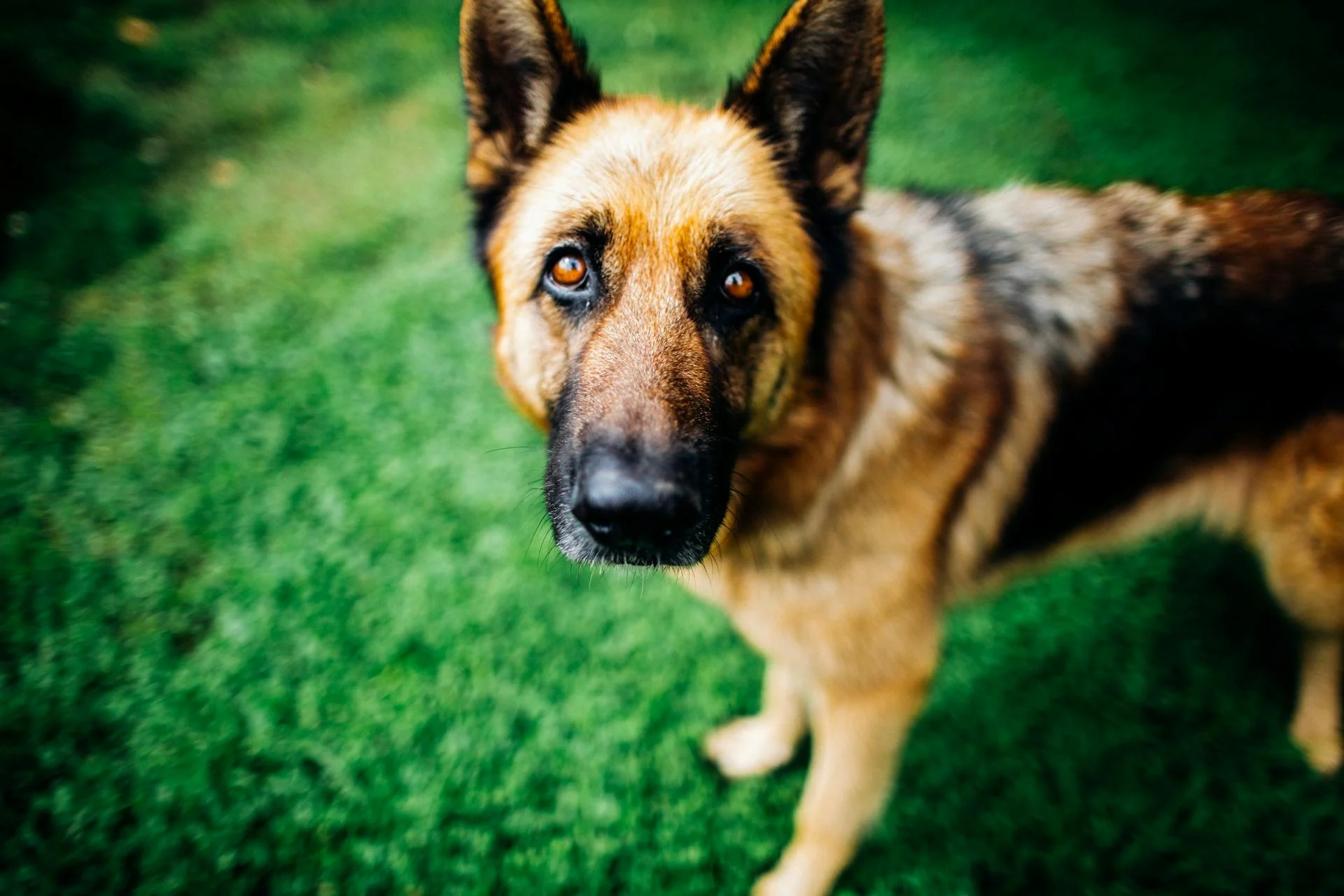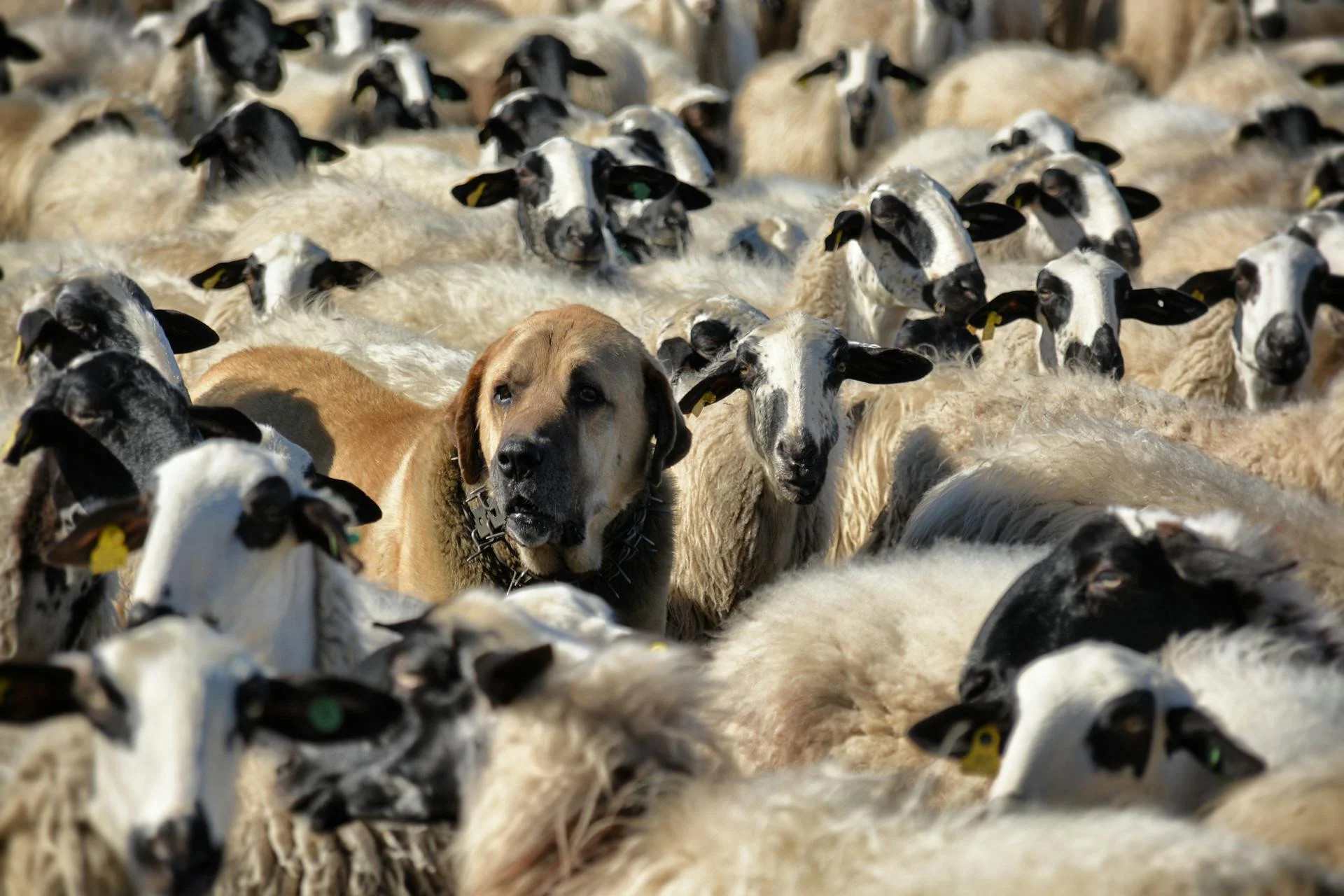
The Romanian Mioritic Shepherd Dog is a rare and ancient breed that's steeped in tradition. This majestic dog has been guarding sheep in the Carpathian Mountains for centuries.
Originating from Transylvania, Romania, this breed is one of the country's national symbols. It's a testament to the region's rich cultural heritage.
The Mioritic Shepherd Dog is a medium-sized dog with a sturdy build and a distinctive appearance.
Quick Facts
The Romanian Mioritic Shepherd Dog is a wonderful breed, and here are some quick facts to get you started:
The Romanian Mioritic Shepherd Dog originates from Romania, specifically the Carpathian Mountains.
This breed is a member of the Livestock Guardian breed group.
They typically reach a height of 28-30 inches at the shoulder.
Their weight ranges from 66-88 pounds.
Their lifespan is around 12-14 years.
Their coat is a thick and fluffy double coat, with colors ranging from white to pale grey to cream.
Broaden your view: Romanian Dog Names
They have a loyal, calm, and disciplined temperament, but can be cautious of strangers.
They require moderate daily walks and outdoor activities.
Training is moderately easy, but requires patience and positive reinforcement, especially with early socialization.
They are generally a healthy breed, but potential concerns include hip dysplasia and elbow dysplasia.
Breed Overview
The Romanian Mioritic Shepherd Dog is a majestic breed originating from the rugged Carpathian Mountains of Romania.
Standing between 28-30 inches tall and weighing up to 88 pounds, these gentle giants are known for their thick, fluffy coats in white, pale grey, and cream shades.
Their calm and disciplined demeanor makes them loyal companions, but their independent nature requires patience and positive reinforcement during training.
Daily walks and outdoor activities are essential for their well-being, and regular brushing is necessary to maintain their dense double coat.
Potential health concerns like hip dysplasia and elbow dysplasia should be monitored, but overall, the breed is known for its robust health.
The breed's cautious approach to strangers and its size and grooming needs require commitment and proper care, but for those willing to invest, the rewards are well worth it.
For another approach, see: Hip Dysplasia Bernese Mountain Dog
Breed Characteristics
The Romanian Mioritic Shepherd Dog is a calm and stable breed, making it a great companion for families. This breed is also a capable guard, standing strong against predators like bears, wolves, and lynx.
Despite being wary of strangers, they are very good with children, making them an excellent choice for families. Their gentle nature around kids is a testament to their loving and protective instincts.
Their coat is a notable feature, with a straight, abundant, and harsh texture that's at least 4 inches long on their head and body. On their legs, the coat is shorter, and the tail is well-furnished.
Size
The Romanian Mioritic Shepherd Dog is a large breed, with most dogs standing between 22.5 to 29 inches at the shoulder.
Some Mioritic Shepherds can be smaller or larger than average for their breed.
Males are generally larger than females, with a noticeable size difference between the two.
The breed is classified as a giant dog, which is a good indicator of its size.
Here's a quick comparison of male and female Mioritic Shepherds:
The average height of a male Mioritic Shepherd is 28 inches (71.5 cm), while the average height of a female is 26 inches (66 cm).
For your interest: Kangal Dog Height in Feet
Coat Color and Grooming
The Romanian Mioritic Shepherd Dog has a unique double coat that's a mix of white and grey. This coat is shaggy and dense, making it perfect for colder climates.
A weekly brushing is all you need to maintain this coat, which is considered low maintenance. This means you won't have to spend hours grooming your dog each week.
The undercoat is very thick and a lighter color than the outer coat, providing extra warmth and insulation. The outer coat is harsh and abundant, with a minimum length of 4 inches on the head and body.
Daily tooth brushing is strongly advisable to keep the teeth plaque free and prevent gum recession and wobbly teeth. This simple habit can make a big difference in your dog's overall health.
During the warmer summer months, make sure your dog has access to enough fresh water to stay cool and hydrated. This is especially important for dogs with thick coats like the Romanian Mioritic Shepherd Dog.
Check this out: Best Food for Dogs with No Teeth
Bite Characteristics
The Mioritic Shepherd's bite force is a notable characteristic of the breed. It's among the strongest in the canine world, with a bite force of above 400 PSI.
This impressive bite force is reflective of their powerful and large stature. It's essential to respect their PSI and take necessary precautions when interacting with them.
The Mioritic Shepherd has a low chance of biting someone, with a low biting potential. This is likely due to their protective nature, which is more focused on safeguarding themselves and their families.
Mioritic Shepherd dogs have an average tendency to nip, chew, and playbite people, especially during puppyhood. This behavior is not aggressive, but rather a common habit that needs to be addressed through proper training.
Here's a comparison of the Mioritic Shepherd's bite force to other breeds:
Keep in mind that the Mioritic Shepherd's bite force is a testament to their powerful nature, and it's crucial to learn how to train them not to bite from an early age.
See what others are reading: Cane Corsos Bite Force
Care and Feeding
The Romanian Mioritic Shepherd Dog needs a lot of space to live and exercise, so a big yard or regular long walks are a must.
Exercise should be in the form of long walks rather than short, intense playtime. Daily exercise is essential for this breed.
This dog is intelligent and will thrive with smart interactive toys and challenging ball games. Adding these to your daily routine will help satisfy their mental needs.
The Romanian Mioritic Shepherd Dog is a social creature and shouldn't be left alone all day. They need interaction and attention from their family.
Regular dental hygiene is crucial, so brush your dog's teeth at least two or three times a week. Daily is even better!
A balanced diet is also essential, with a high-quality food formulated for large-sized breeds with medium energy levels.
See what others are reading: Can Shiba Inu Reach 1 Dollar
Care
To provide your Romanian Mioritic Shepherd Dog with the best possible care, you'll need to consider their exercise needs. This breed requires a lot of space to live and exercise in, so a small or cramped living space is not suitable.

Daily exercise should take the form of long walks rather than short, intense playtime sessions. You'll want to add smart interactive toys and challenging ball games to your daily routine to satisfy your dog's mental needs.
As a social creature, your Romanian Mioritic Shepherd Dog will not fare well being left alone all day. Regular interaction and training from an experienced hand are essential.
Dental hygiene is crucial for this breed. Brush your Romanian Mioritic Shepherd Dog's teeth at least two or three times a week to remove tartar buildup and bacteria.
Nail care is also important. Check your dog's nails once a month and see if they need to be trimmed, although regular outdoor time can help keep their nails in great condition naturally.
By following these care tips, you can help keep your Romanian Mioritic Shepherd Dog happy and healthy.
Consider reading: Yorkshire Terrier Care
Reproducibility
Reproducibility is a crucial aspect of caring for a Mioritic Shepherd. This breed typically has a gestation length of 60-64 days, which means you can expect puppies to arrive about two months after mating.

A Mioritic Shepherd's reproductive cycle is quite specific, consisting of four stages: Proestrus, Estrus, Diestrus, and Anestrus. Proestrus lasts around 9 days, during which the female's vulva will swell and she'll exhibit a bloody discharge. This is the time when males will start to take notice.
The Estrus stage is when the female is receptive to mating and can last anywhere from 3 to 11 days. You'll know she's in this stage by a decrease in discharge and a lightening in color. The vulva will also become soft and enlarged.
Diestrus occurs around day 14 and is marked by a vivid red discharge, which will eventually come to an end. The vulva will return to its normal size, and the female will no longer permit mating. This stage is a critical time for rest and recovery.
To ensure the health and well-being of your Mioritic Shepherd, it's essential to breed them responsibly. This means not breeding them more than once a year, as more frequent breeding can be detrimental to their health. Be cautious of puppy mills, where dogs are bred in inhumane conditions, and prioritize buying from reputable breeders who prioritize the needs of their dogs.
Here's a brief overview of the reproductive stages of a Mioritic Shepherd:
Living with a Mioritic Shepherd Dog
Living with a Mioritic Shepherd Dog can be a wonderful experience, but it's essential to understand their needs and personality traits. The Romanian Mioritic Shepherd Dog is a good choice for a household with children, but early socialization and boundary setting are crucial to ensure a harmonious household.
Supervise play sessions between children and the dog, especially when they're young, as the dog's size can be intimidating. A Mioritic Shepherd can form protective bonds with other pets, but early interactions should be supervised to prevent any conflicts.
A Mioritic Shepherd needs a steady level of activity throughout the day, including at least two long walks and some off-leash time for running and playing. They also require mental stimulation, such as obedience training or agility, to feel engaged and fulfilled.
Here are some key exercise and activity needs for Mioritic Shepherds:
Keep in mind that Mioritic Shepherds are not the most playful breed and can be loud, so they may not be the best choice for apartment living or those seeking a quiet dog.
Children and Pets
The Romanian Mioritic Shepherd Dog is a great choice for households with children, but it's essential to remember that they're a huge breed, so always supervise play sessions with very young kids.
Early socialization is key with this breed, and setting boundaries on both sides is crucial for a harmonious household.
If you're bringing a new Mioritic Shepherd into a household with existing pets, supervise their early interactions to ensure a smooth transition.
Rewarding good behavior and adhering to a proper training regimen will pay off in the long run with this breed.
Some Mioritic Shepherd owners have reported that their dogs can form protective bonds with other pets, but it's still important to supervise interactions.
A few owners have mentioned that their Mioritic Shepherds can be prone to nipping, so be sure to address this behavior early on.
For your interest: Alaskan Malamute Behavior
Exercise and Activity Levels
Living with a Mioritic Shepherd Dog requires a good understanding of their exercise and activity needs. They are a herding and guarding breed that needs mental occupation and physical exertion.
Mioritic Shepherds need at least two long walks daily, along with some off-leash time to run free and play. This breed is not suited for running all day like some shepherding breeds, but they do need a steady level of activity throughout the day.
To keep your Mioritic Shepherd happy and healthy, engage in daily obedience training or agility activities. This will give them a chance to show off their prowess at following commands and provide mental stimulation.
In terms of exercise needs, Mioritic Shepherds have an average requirement. They are satisfied with short walks every weekday and a long one on weekends. If you live an active life, this breed can be a good choice for you.
Here's a rough guide to their exercise needs:
Keep in mind that Mioritic Shepherds are not the most playful breed, but they do enjoy playing. They are, however, a particularly loud breed and may bark frequently due to fear, attention, alarm, boredom, greeting, separation anxiety, compulsive barking, or defense.
Health and Lifespan
The Romanian Mioritic Shepherd Dog is a healthy breed, but like all breeds, they can be prone to certain health issues. Gastric torsion, also known as bloat, is a potentially life-threatening condition that can occur when the stomach fills with gas, food, or fluid and then twists.
Some other common health problems that Romanian Mioritic Shepherd Dogs may suffer from include hip dysplasia, a malformation of the hip joint that can cause pain, lameness, and arthritis over time.
To ensure the health of your Romanian Mioritic Shepherd Dog, it's essential to regularly check for signs of these conditions and seek veterinary attention immediately if you notice any unusual symptoms. Regular veterinary visits, at least once a year, can also help detect any potential health issues early on.
The average lifespan of a Romanian Mioritic Shepherd Dog is 12-14 years, with some living up to 13 years. They can adapt well to harsh weather conditions, but it's crucial to take precautions to keep them safe and comfortable during extreme temperatures.
Additional reading: 100 Years Ago Original Boston Terrier
Health

The Mioritic Shepherd is a relatively healthy breed, but like all dogs, they can be prone to certain health issues. Gastric torsion, also known as bloat, is a potentially life-threatening condition where the stomach twists, cutting off the blood supply.
Early signs of gastric torsion may include restlessness, abdominal distention, excessive drooling, retching without producing much, and pale gums. Immediate veterinary attention is crucial if you suspect your dog has this condition.
Hip dysplasia is another common health issue in Mioritic Shepherds, where the hip joint doesn't form properly, causing pain and arthritis over time. Early signs may be subtle, like difficulty getting up or reluctance to run or jump.
To minimize the risk of these health issues, it's essential to check the lineage of the parent dogs when seeking a Mioritic Shepherd puppy. A close family heritage can increase the risk of genetically linked health problems.
Regular veterinary check-ups are also crucial for maintaining your Mioritic Shepherd's health. Aim for at least one complete physical check-up per year, and don't hesitate to call your vet if you notice any symptoms.
Curious to learn more? Check out: Rhodesian Ridgeback Problems

Here's a breakdown of the average lifespan of a Mioritic Shepherd:
This breed can adapt well to harsh weather conditions, making them a great choice for mountain living. However, it's essential to take precautions to keep your dog safe and comfortable during extreme cold weather, as they can suffer from frostbite and hypothermia.
Related reading: Bernese Mountain Dog Cold Weather
Age in Human Years
As we explore the health and lifespan of Mioritic Shepherds, one important factor to consider is their age in human years. A 1 year old Mioritic Shepherd is roughly equivalent to a 15 year old human.
At 2 years old, your Mioritic Shepherd is similar in age to a 25 year old human. This is a critical period in their development, and they'll be learning and growing rapidly.
By 3 years old, your Mioritic Shepherd has reached the equivalent of a 35 year old human. They'll be fully grown and may start to show some signs of aging.
See what others are reading: Bull Terrier Back Then
Here's a breakdown of the human age equivalent for Mioritic Shepherds of different ages:
- 1 year old Mioritic Shepherd = 15 year old human
- 2 year old Mioritic Shepherd = 25 year old human
- 3 year old Mioritic Shepherd = 35 year old human
- 4 year old Mioritic Shepherd = 45 year old human
- 5 year old Mioritic Shepherd = 55 year old human
- 6 year old Mioritic Shepherd = 65 year old human
- 7 year old Mioritic Shepherd = 75 year old human
- 8 year old Mioritic Shepherd = 85 year old human
- 9 year old Mioritic Shepherd = 95 year old human
- 10 year old Mioritic Shepherd = 105 year old human
- 11 year old Mioritic Shepherd = 115 year old human
- 12 year old Mioritic Shepherd = 125 year old human
- 13 year old Mioritic Shepherd = 135 year old human
- 14 year old Mioritic Shepherd = 145 year old human
- 15 year old Mioritic Shepherd = 155 year old human
- 16 year old Mioritic Shepherd = 165 year old human
- 17 year old Mioritic Shepherd = 175 year old human
- 18 year old Mioritic Shepherd = 185 year old human
By 18 years old, your Mioritic Shepherd has reached the equivalent of an 185 year old human. This is a remarkable milestone, and they'll likely be nearing the end of their natural lifespan.
Sources
- https://dogtime.com/dog-breeds/romanian-mioritic-shepherd-dog
- https://www.dogzone.com/breeds/romanian-mioritic-shepherd-dog/
- https://www.ukcdogs.com/romanian-mioritic-shepherd-dog
- https://brit-petfood.com/en/breed-catalog/sheepdogs-and-cattle-dogs-except-swiss-cattle-dogs-/romanian-mioritic-shepherd-dog
- https://dogell.com/dog-breed/mioritic
Featured Images: pexels.com


